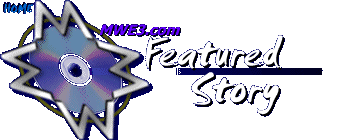The
Road To Venezuela
An Interview with
Stackridge guitarist Andy Davis
by Robert
Silverstein
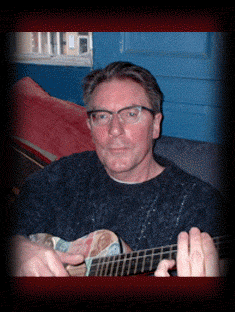 While
it is true that I didn’t have the luxury of hearing the new Stackridge
album, Sex And Flags, prior to this interview, I knew enough
about the band from their legendary ‘70s releases and getting
a chance to speak with one of the band’s co-founders—guitarist
and main songwriter Andy Davis was indeed a chance to bring things full
circle. A couple weeks after the interview, after having finally heard
the album, I can assure long time fans that the nearly 30 years of
waiting for the original band to record again was worth it. Despite
a fine comeback without Davis—called Something For The Weekend—by
Stackridge in 1999, it was obvious that a full-fledged reunion would
only be fully realized with a reunion with Davis. Imagine a living
John Lennon not rejoining for Beatles Anthology! Gratefully,
four key members of the original Stackridge—Andy Davis, James
Warren, Mutter Slater and Crun Walter—have reunited on ten new
Sex And Flags tracks with the extra inclusion of five
more tracks from their ‘99 Something For The Weekend album.
Also interesting to note, that the band formed by Andy and James Warren
following the last Stackridge album from 1976, Mr. Mick—The
Korgis are also represented with a simultaneously released collection
on Angel Air. Not merely an anthology, the Korgis Kollection also
features a batch of newly recorded Korgis tracks from Davis and Warren
along with some of the now famous early ‘90s rerecordings of
their late ‘70s and early ‘80s pop classics. Both Sex
And Flags and the new Korgis Kollection puts the unique
progressive rock and pop history that Stackridge and The Korgis brought
to the music world into perspective in the extensive booklets featured
with both releases. One of the premier CD reissue labels in England,
Angel Air continues to amaze with great new and vintage reissues.
When it comes to the new and vintage classic pop and rock from Great
Britain, it doesn’t get any better than Stackridge. It’s
an honor to let long time fans and newcomers alike in on one of the
great pop surprises of the new millennium. The following transatlantic
phone interview between Robert Silverstein and Andy Davis took place
on April 27, 2005.
While
it is true that I didn’t have the luxury of hearing the new Stackridge
album, Sex And Flags, prior to this interview, I knew enough
about the band from their legendary ‘70s releases and getting
a chance to speak with one of the band’s co-founders—guitarist
and main songwriter Andy Davis was indeed a chance to bring things full
circle. A couple weeks after the interview, after having finally heard
the album, I can assure long time fans that the nearly 30 years of
waiting for the original band to record again was worth it. Despite
a fine comeback without Davis—called Something For The Weekend—by
Stackridge in 1999, it was obvious that a full-fledged reunion would
only be fully realized with a reunion with Davis. Imagine a living
John Lennon not rejoining for Beatles Anthology! Gratefully,
four key members of the original Stackridge—Andy Davis, James
Warren, Mutter Slater and Crun Walter—have reunited on ten new
Sex And Flags tracks with the extra inclusion of five
more tracks from their ‘99 Something For The Weekend album.
Also interesting to note, that the band formed by Andy and James Warren
following the last Stackridge album from 1976, Mr. Mick—The
Korgis are also represented with a simultaneously released collection
on Angel Air. Not merely an anthology, the Korgis Kollection also
features a batch of newly recorded Korgis tracks from Davis and Warren
along with some of the now famous early ‘90s rerecordings of
their late ‘70s and early ‘80s pop classics. Both Sex
And Flags and the new Korgis Kollection puts the unique
progressive rock and pop history that Stackridge and The Korgis brought
to the music world into perspective in the extensive booklets featured
with both releases. One of the premier CD reissue labels in England,
Angel Air continues to amaze with great new and vintage reissues.
When it comes to the new and vintage classic pop and rock from Great
Britain, it doesn’t get any better than Stackridge. It’s
an honor to let long time fans and newcomers alike in on one of the
great pop surprises of the new millennium. The following transatlantic
phone interview between Robert Silverstein and Andy Davis took place
on April 27, 2005.
RS: Andy, it’s great to speak to you. I’m a long time fan
of you and Stackridge from way back in the day of The Man In The
Bowler Hat days.
AD: Yeah, you’re almost as old as I am.
RS: I picked that record up when I was living in L.A. in 1974 and
I became a Stackridge devotee.
AD: Wow...good.
RS: I wanted to talk with you about these two new CDs Angel Air over
in England has just released. A new Stackridge CD called Sex And
Flags and the Korgis Kollection. It was strange that you
weren’t with Stackridge on their comeback CD from ‘99 Something
For The Weekend.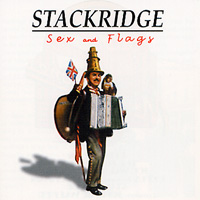
RS: Well I am now. I wasn’t a few years back, but that’s
a long story. Now we’re back to the four main songwriters in
the band, me, James Warren and Crun Walter and Mick Slater. So we
went through a bit of a troubled time but now we’re all together
again, which is good.
RS: So Sex And Flags has new stuff on it?
AD: Oh, lots of new stuff, yeah. There’s about eight or nine
brand new tracks on there, yeah.
RS: That’s great, because the ‘99 Stackridge album Something
For The Weekend was a cool record but it was missing your
music.
AD: Have you heard Sex And Flags yet?
RS: No, Angel Air sent a copy of the Korgis Kollection CD but
they said it didn’t come out yet.
AD: Sex And Flags plays very well. It’s a really nice
album, from start to finish. I believe there are five or six tracks
from Something For The Weekend, but the rest is completely
new. I’m very pleased with it.
RS: How did you come up with that name? It sounds like the state of
the world.
AD: (laughter) That was Crun, the bass player came up with that. We
tend to deal in sort of different departments in Stackridge these
days. I sort of do the production and James and I do the writing.
Crun, being an old art student loves to do the artwork and stuff.
I was stuck for a title and I said, ‘what are we going to call
this Crun?’ and he came up with Sex And Flags.
RS: Interesting that Angel Air has also done a new compilation from
your other band you have with James The Korgis, called The Korgis
Kollection, which also adds in some new tracks. I guess you and
James wrote some new stuff as well. It’s a field day for
Stackridge fans.
AD: Yeah, that’s pretty much the same. I can’t remember
how many but there are, I believe eight or nine brand new tracks on
that album, and a few of our old hits and a few various album tracks
that we thought were good but were overlooked so we put basically
a new album together with that one.
RS: So there are new tracks on the Korgis Kollection CD, though
I was surprised that two of my favorite Korgis tracks from the first
U.S. release back in 1979, “Young And Russian” and “Chinese
Girl” were not on it.
AD: The problems with those tracks are, we don’t own the copyrights,
believe it or not. That belongs to Trojan Records and now EMI I think.
So we don’t actually own them any more. The reason we put on
“Everybody’s Got To Learn Sometime” and “If I
Had You” is we rerecorded them. We made sort of carbon copies
of them a long time ago, ten years ago now. Anything we want to include
on a compilation, we have to rerecord, ‘cause we don’t actually
own them. Seems ridiculous to me, but that’s the way it is. So
if we wanted to put “Young And Russian” on it, we’d
have to rerecord it.
RS: On Sex And Flags is there any instrumental music? In addition
to your singing in Stackridge, I also enjoyed the occasional instrumental
track the band featured on the album.
AD: No, there are no instrumentals on that. There’s a song from
Mutter called “Beating A Path To Your Door”, which has got
long instrumental passages on it. It’s like one of our sort of
epic prog-rock things we used to do. That’s the only one I think.
RS: Do you see Sex And Flags as sort of a renaissance for the
band or a one off kind of thing?
AD: I’d love it to be. We’d all love it to be a renaissance
of the band. It depends really how it’s received and if we can
get some work generated from it and how it’s viewed by the business
really because we would love to take it on the road and do some live
work but I suppose only if we get some backing from the music biz
on it. Do you understand what I’m saying?
RS: Did you guys ever come over to the States to play?
AD: No, we never did.
RS: Or is that another American music business disaster we created?
AD: We never quite got there. We had about five or six occasions when
American tours were penciled in but they were all postponed. We never
quite got there, which was a great shame really.
RS: Hank Marvin calls it a bitter pill that The Shadows never played
here either. I know Sire Records released several Stackridge albums
in the ‘70s, The Man In The Bowler Hat, which they released
as Pinafore Days and Extravaganza so it’s a shame
you couldn’t come and promote it more.
AD: Yeah, that’s right. Sire Records were pretty good to us.
They were really rooting for us to come across to the States but for
some reason it never quite happened the way it should have been, y’know?
I went across in 1976 and spent some time with Seymour Stein and we
talked about how we could do it but after about three weeks I came
back and still it didn’t happen. It was very disappointing really.
But, there you go.
RS: I really enjoyed your solo album from 1990. You’ve only done
one solo album?
AD: Yeah, Clevedon Pier.
RS: What a great album. That had your instrumental version of
“Women Of Ireland” on it?
AD: Yeah, that’s right. Angel Air are putting that out again
in the Autumn, in September. Did you know that?
RS: That one came out here on Relativity. I was disappointed they
didn’t follow that one up. That’s the American music business
for you.
AD: Yeah, well pretty much the same here.
RS: Was that album a product of the post late ‘80s New Age kind
of boom?
AD: I suppose it was. It’s always nice when somebody asks you
to make a solo album. It’s the only one I’ve done. I’d
like to do some more. I maybe doing some more with Angel Air. At the
time, that was back in 1990, I was asked to do it by a friend of mine,
Peter Van Hooke, who used to be Van Morrison’s drummer. He’d
formed a record company so I kind of jumped at the chance. At the
time I assumed I would do a few more but that turned out to be the
only one. So that’s a shame.
RS: Yeah, the smooth, woody sound of Clevedon Pier wasn’t
quite as wild as that great Stackridge progressive instrumental “Purple
Spaceships Over Yatton”! Back in the ‘70s it always seemed
like Stackridge was always bordering between the more progressive
rock sound and the sort of Lennon/McCartney approach to pop. Speaking
of which, you got to play with John Lennon once right?
AD: Yes, well I did...yes. (laughter) You ask that question as if
you know the answer...(laughter)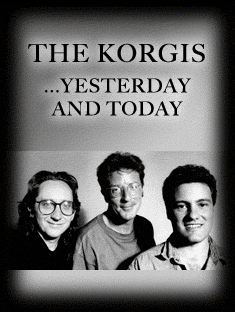
RS: ‘Cause I heard you played on Imagine.
AD: I did, yeah. I played on Imagine when I was very young,
when Stackridge were so poor we were camping out in a forest in south
London. We were sleeping in tents. Bizarre, I just happened to be
in the right place at the right time and got invited down to John’s
house and played on three tracks and stayed about three days and played
some stuff.
RS: Do you remember which tracks you played on Imagine?
AD: Yeah, I played on “Oh, Yoko”, “Gimme Some Truth”
and “How?”
RS: Did you play piano or guitar?
AD: Guitar.
RS: Would you say Hank Marvin was an influence as well, say in the
pre-Beatles years?
AD: Definitely. Well Hank was an influence really before I learned
to play. I just wanted to be him. By the time I actually started to
play the guitar, I was sort of moving on slightly to John Mayall and
that stuff. By the time I really got to grips with the guitar I was
really into British blues. John Mayall, Eric Clapton, Peter Green...that
sort of stuff, all major influences.
RS: It’s funny that all those guitarists cite Hank as an influence
yet they went into such different styles.
AD: Yeah, well I know Hank is sort of a superb player isn’t he?
It’s just so difficult to imitate him or do what he does ‘cause
it’s just so perfectly done. You just can’t do it as good
as he does. I suppose Peter Green was my main influence growing up
through those years. And George Harrison, who I think is always an
underrated guitar player, considering the amount of styles he mastered
by the time he was 19 years old for God’s sake. He was a fantastic
player really. If you listen to early Beatles, he was playing country-rock
and rock and roll and all sorts of stuff, which for a guy so young,
was phenomenal.
RS: Also after Stackridge you did lots of session work like playing
with Tears 4 Fears?
AD: I did a lot of different stuff. I played with Tears 4 Fears, Julian
Cope, Bill Nelson. Do you remember Bill Nelson, from Be-Bop Deluxe?
I played with all those guys.
RS: When did you play with Bill Nelson?
AD: Let me see. It was mid ‘80s when I played with Bill and his
outfit then was called the Bill Nelson Orchestra. We recorded some
stuff and we did a couple of tours. It was called The Bill Nelson
Orchestra then, it wasn’t Be-Bop Deluxe. That was several years
afterwards. I did a few session with bizarre people after that. Yeah,
Moondog was one of them. Moondog was fantastic. I sung in a choir
for him. It was marvelous.
RS: Moondog, the Viking guy?
AD: Yeah! Unfortunately he died a couple years ago didn’t he?
RS: In the ‘60s I used to see him standing like on the streets
of midtown Manhattan in his Viking suit and his great beard right
near the CBS building on 52nd street. Man, that was a scary sight.
AD: Yeah, I really enjoyed working for him. I did some stuff for Spiritualized.
The very recent thing I’ve done is with Goldfrappe, you know
Goldfrappe?
RS: Is that the girl singer?
AD: Allison Goldfrappe. She’s very good. Very talented woman.
RS: Did you write stuff for her?
AD: No, I just played keyboards and ukelele. And I did a couple of
tours with her as well, which was good fun.
RS: You played all the lead guitar work in Stackridge?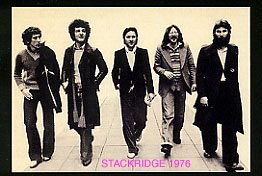
AD: Yeah. Back then we had a mixture. We used a Gibson 330 and a couple
of Fenders. A Jaguar and a Jazzmaster, which weren’t very fashionable
at the time. I’ve got a small group of guitars I use now. I’ve
got a Fender Telecaster, just a standard one from about ‘85,
which I love. I’ve got an old archtop, which is anonymous. Somebody
told me it looks like a Gibson GI guitar. I’ve never heard of
this but somebody, an old jazz player in England told me that during
the second world war, Gibson and various makers gave guitars away
to troops in Europe during the war, which is news to me but this is
what I was told. So they were unmarked, they just gave guitars away
and some of them made their way back to Britain. And I believe what
I’ve got is one of those but I’m not entirely sure. I’ve
got a Fender 12 string, a couple of lap steels and a host of ukeleles.
I’m a big ukelele fan, a Martin and several proper ukes, which
I think are great for writing on.
RS: George Harrison was another big ukelele fan.
AD: Yeah, yeah...there are lots of ukelele fans in this country now.
They all get together occasionally. (laughter)
RS: I could never understand how you could write a song on a ukelele.
AD: Yeah, with difficulty on a standard one, but a baritone is a great
instrument. It’s tuned the same as the guitar, but you’ve
only got the top four strings. And I spent some time in Nashville
about five or six years ago with some great writers there. Roger Cook
is the main one. And Roger Cook, I don’t know if you know him,
he writes everything on a baritone ukelele.
RS: He’s living in Nashville?
AD: He’s been living in Nashville a long time now. Although he
came from Bristol originally, where I come from. He carries a baritone
ukelele around in a carrier bag, to writing sessions. He’s slightly
eccentric, you could say. (laughter)
RS: He wrote some great stuff for Hank Marvin and also Gene Pitney,
“Something’s Got A Hold Of My Heart.” I think he wrote
some stuff with Jerry Lordan too.
AD: I don’t know what it is about a baritone uke. I suppose ‘cause
there’s only four strings, you have to keep the chords so simple.
It’s good for writing, it sort of filters out all the unnecessary
complications. It’s tuned exactly the same as the top four strings
on a guitar.
RS: I’ll have pick one up! Can you recommend a good one? Which
brand of ukeleles do you favor?
AD: I find it’s very difficult to find anything between dirt
cheap, 15 pounds or 25 to 30 dollars, up to...the next stage up you
got seems to be Gibsons and Martins, which are five or six hundred
dollars. Very difficult to find anything between. What you’ve
got to look for is something made out of koa wood, which is trees
that only grow in Hawaii. And I believe that’s traditionally
what ukeleles were made from. It’s very light and has a lovely
tone. And if you’re lucky you can find a cheap uke made out of
that. I’ve got a lovely one, which is probably worth nothing
but it’s got a beautiful tone and it’s made out this really
delicate koa wood with a lovely grain on it. I wish I could show it
to you, but obviously I can’t. (laughter)
RS: How about acoustic guitars these days?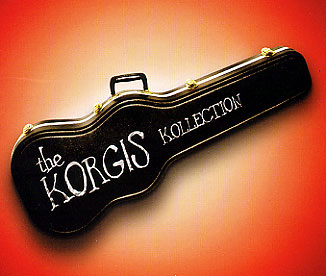
AD: I’ve got a couple. My favorite one is, again not very fashionable,
it’s a Frammus, a king, which I believe is made in Bavaria in
Germany. It’s a jumbo with a cutaway. Before I got it, I was
always searching for a jumbo with a cutaway because I like a big sort
of fat sound but I do like to get up to the top end of the neck. So
that was difficult to begin with, to find one with that cutaway. And
then I found this one in a junk shop and got a friend of mine to put
a new neck on it, and it’s great. It’s lovely and everyone
else seems to love it as well. It’s not worth a great deal, but
that didn’t bother me.
RS: I told you when I first started talking you, how the Stackridge
album, The Man In The Bowler Hat was always such a big influence
on me. I was always amazed that George Martin produced that album.
How did Stackridge meet up with Sir George?
AD: Well, it was through our manager at the time. I don’t know
how he made the connection but George wanted to start a sort of stable
of bands and a management company. And he chose our manager at the
time, Mike Tobin, to head this company. Strangely enough, Roger Cooke
and Roger Greenaway were part of the stable of writers at the time.
So, we all sort of hooked up together and it seemed only natural that
George would produce our album once that happened.
RS: So many great songs on that album. “The Road To Venezuela”
still haunts me.
AD: (laughter) It’s one of my favorites too. It’s a shame
we didn’t do a second one, really, with George. It’s a terrible
shame, but there you go.
RS: After The Man In The Bowler Hat, Stackridge made a very
different kind of record without James Warren and a different lineup
called, Extravaganza. Did that ever come out on CD? I saw it
on Amazon.com for fifty dollars.
AD: Fifty dollars? Jeezus. I’m really not sure who has the rights,
second time around on CD. I lose track. They come out on so many different
labels. There’s so many different licensing deals. I can’t
imagine who would have put them out in the States, but they certainly
weren’t limited and I don’t know, to be honest, if they’re
available in England at all, or in the States. It’s one of those
things I just lose track of. Yeah, when we made that switch in 1974,
actually James didn’t leave. The band sort of imploded, like
bands do. We’d been going for four years and the wind went out
of us and we went our separate ways, which was a terrible shame really.
A few years later we were ready to get back together again but we
seemed to think it was too late. The scene had so radically changed
by the late ‘70s and early ‘80s. It wasn’t until now
really, the late ‘90s or now, that we can consider reforming.
It seems to be taking it a bit to extremes waiting for so long but...
RS: Looking back, do you have any favorite Stackridge period or album?
AD: My particular favorite is Friendliness, the second album,
although that was probably the worst produced. We didn’t actually
have a producer for that one so we ended up co-producing it with an
engineer we’d never met before. He did a good job but I think
that the selection of songs is probably the nicest, the best. I like
Bowler Hat as well but I think Friendliness had a better
selection of tunes on it.
RS: I think it would be great to have a compilation of the Stackridge
instrumental tracks. You were one of the few bands that were doing
instrumentals in between the vocal stuff.
AD: Yeah. I used to like the instrumentals. “God Speed The Plough”
and “Lummy Days”...yeah.
RS: So for future plans, you may consider releasing a second solo
album?
AD: Yeah, I’d love to. I’ve got some stuff that I recorded
that I really want to put out which are just basic songs with, strangely
enough, sort of a country feel. Angel Air is doing Clevedon Pier
in the Autumn, I’d love to do that one next year.
RS: Are you going to have bonus tracks on the upcoming Autumn 2005
reissue of Clevedon Pier?
AD: Yeah, one or two. I’m not sure how many yet, but one
or two.
RS: Any other new plans for you?
AD: I’m writing music for a film score now. It’s a full
length animated movie, believe it or not, of the Fabulous Furry Freak
Brothers!
RS: Oh my god, you’re kidding!
AD: No, I’m not kidding. It’s being made just down the road
in Bristol. And Gilbert Shelton, the original artist, you’ve
probably heard of, is writing the script and the screenplay. It’s
really exciting. I’m having a really great time. We’re only
in the early stages. It’s going to be eighteen months before
it’s finished. I’m writing it with a banjo player called
Leon Hunt. Gilbert likes ukeleles and banjos and tubas. So we’ve
been writing all this mad stuff to go for it and so far, touch wood,
it’s been going really well.
RS: Gilbert lives over there?
AD: He lives in Paris but he comes over to the U.K. every two weeks
to see what’s going on and we go over to the studios where it’s
being shot. We play him some new stuff, he listens and says whether
he likes it or not.
RS: Do you still follow the music scene these days?
AD: I tend to not sort of go in search of new stuff ‘cause I
just think I’ve got enough stuff I’m familiar with to keep
me going. I don’t know if that sounds like I should get out more,
I probably should, but I’m really happy with my Randy Newman
albums and World Party and Blue Nile and Ry Cooder and stuff I listen
to. When something new comes my way I love it. I’m not a huge
fan of the music scene in England at the moment anyway. It all seems
to be pretty much disposable pop. But there you go. I wouldn’t
sort of write it off.
RS: So the Fabulous Furry Freak Brothers are next? Can’t wait
to hear Sex And Flags. And how about another Stackridge album
for next year!
AD: There could well be, yeah, I really hope there will be and I hope
you like the new album when you hear it. It sounds like a really nice
album to me. It’s got a nice mixture of stuff on it. I’m
doing vocals on about four tracks. James is doing it on like six tracks.
No instrumentals unfortunately but it’s got a really nice selection
of songs.
Thanks
to Andy Davis @ www.stackridge.net
and to Peter Purnell @ www.angelair.co.uk
